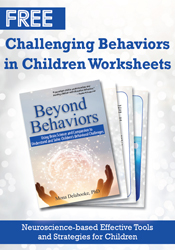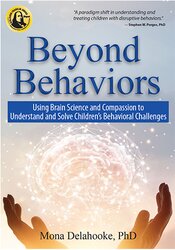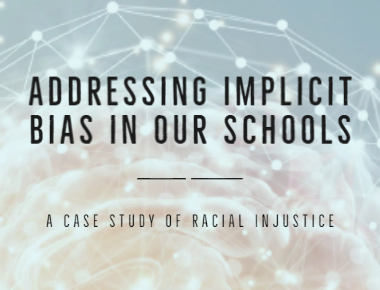Addressing Implicit Bias in Our Schools
A Case Study of Racial Injustice

The protests and headlines of recent weeks have forced many of us to examine our lives and communities through a new lens. In the process, we have opened our eyes to bias and discrimination as never before.
Consider the experience of Loren, a Black child whose teachers treated him differently from his white peers from his earliest years. By the time he turned three, two different preschools had kicked him out. That hardly made him unique. Eighteen percent of preschool students are Black, but they account for 48 percent of the children who receive more than one out-of-school suspension.
After preschool, he spent nearly six years in a school where the staff didnãt understand him. He was diagnosed with Oppositional Defiant Disorder (ODD) and Attention Deficit Hyperactivity Disorder (ADHD), but instead of recognizing his behavioral challenges as responses to stress, his teachers treated them as signs of defiance and noncompliance.
The truth was that Loren simply didnãt feel safe at school. He experienced unrelenting toxic stress. His bodyãs stress-management system was constantly activated, and he lacked the support of adults who might protect him.
When he was twelve, a peer standing behind him in the lunch line unexpectedly tapped him. Loren, startled, punched the boy.
What triggered that reaction? Over time, Lorenãs brain had become wired not for safety but for defense. His early and prolonged adverse experiences at school had led to his unpredictable behaviorsãadaptive, instinctive, defensive reactions to circumstances that might have appeared unthreatening to others.
These incidents continued to accumulate until, eventually, Loren found himself in juvenile hall, another statistic in the school-to-prison pipeline. Indeed, most youths who experience such fates have endured the same sort of stress-loading conditions, including poverty, food insecurity, racism, and implicit bias.
How can we shift our perspective on the true causes of challenging behaviors like Lorenãs? It takes time, resources, and training. We need to ensure that children and families have access to educators and therapists who are aware of our societyãs implicit bias and trained in trauma-informed practicesãwho recognize and respect each familyãs and each childãs experiences, individual differences, culture, learning pathways and abilities, and social-emotional development. In the process, itãs crucial to consider how factors such as poverty, race, power, and privilege affect a childãs perception of the world as safe or unsafe.
In a world rife with injustices and implicit bias, we all need to acknowledge the additional burden of threat children of color experience.
I should add that Iãm speaking as much to myself as to my colleagues and peers. Those of us who work in or consult for preschoolsãand all schoolsãought to ask ourselves these questions to bring implicit bias to our consciousness:
Together, and with self-compassion, I carry the hope that we can begin to heal the injustices within our educational system. Day by day, each of us can make a difference to bring hope and equality to children of color in our schools.
*I share more about redefining behavioral challenges for children and for those who experience bias and trauma in Beyond Behaviors: Using Brain Science and Compassion to Understand and Solve Childrenãs Behavioral Challenges.
We also want to send our congratulations to Mona Delahooke and Beyond Behaviors: Using Brain Science and Compassion to Understand and Solve Childrenãs Behavioral Challenges on winning the gold medal at the 2020 IBPA Benjamin Franklin Awards for editorial and design excellence in the Psychology category!
You can watch her accept the award here:
Consider the experience of Loren, a Black child whose teachers treated him differently from his white peers from his earliest years. By the time he turned three, two different preschools had kicked him out. That hardly made him unique. Eighteen percent of preschool students are Black, but they account for 48 percent of the children who receive more than one out-of-school suspension.
After preschool, he spent nearly six years in a school where the staff didnãt understand him. He was diagnosed with Oppositional Defiant Disorder (ODD) and Attention Deficit Hyperactivity Disorder (ADHD), but instead of recognizing his behavioral challenges as responses to stress, his teachers treated them as signs of defiance and noncompliance.
The truth was that Loren simply didnãt feel safe at school. He experienced unrelenting toxic stress. His bodyãs stress-management system was constantly activated, and he lacked the support of adults who might protect him.
When he was twelve, a peer standing behind him in the lunch line unexpectedly tapped him. Loren, startled, punched the boy.
What triggered that reaction? Over time, Lorenãs brain had become wired not for safety but for defense. His early and prolonged adverse experiences at school had led to his unpredictable behaviorsãadaptive, instinctive, defensive reactions to circumstances that might have appeared unthreatening to others.
These incidents continued to accumulate until, eventually, Loren found himself in juvenile hall, another statistic in the school-to-prison pipeline. Indeed, most youths who experience such fates have endured the same sort of stress-loading conditions, including poverty, food insecurity, racism, and implicit bias.
How can we shift our perspective on the true causes of challenging behaviors like Lorenãs? It takes time, resources, and training. We need to ensure that children and families have access to educators and therapists who are aware of our societyãs implicit bias and trained in trauma-informed practicesãwho recognize and respect each familyãs and each childãs experiences, individual differences, culture, learning pathways and abilities, and social-emotional development. In the process, itãs crucial to consider how factors such as poverty, race, power, and privilege affect a childãs perception of the world as safe or unsafe.
In a world rife with injustices and implicit bias, we all need to acknowledge the additional burden of threat children of color experience.
I should add that Iãm speaking as much to myself as to my colleagues and peers. Those of us who work in or consult for preschoolsãand all schoolsãought to ask ourselves these questions to bring implicit bias to our consciousness:
- Am I spending more time surveilling or watching Black and brown children (especially Black boys) for infractions more than I am for white children?
- Do I use harsher words, consequences, or actions with Black and brown children than I do with white children?
- Am I keeping a watchful eye for moments to respectfully bring implicit bias awareness to the adults around me?
Together, and with self-compassion, I carry the hope that we can begin to heal the injustices within our educational system. Day by day, each of us can make a difference to bring hope and equality to children of color in our schools.
*I share more about redefining behavioral challenges for children and for those who experience bias and trauma in Beyond Behaviors: Using Brain Science and Compassion to Understand and Solve Childrenãs Behavioral Challenges.
We also want to send our congratulations to Mona Delahooke and Beyond Behaviors: Using Brain Science and Compassion to Understand and Solve Childrenãs Behavioral Challenges on winning the gold medal at the 2020 IBPA Benjamin Franklin Awards for editorial and design excellence in the Psychology category!
You can watch her accept the award here:
Get this NEW approach to solving behavioral challenges...

Weãve created this set of worksheets filled with handouts and activities to help you and your clients identify the root of those ãchallenging behaviors.ã
aim to provide a new context to understand behavioral challenges and offer a roadmap for making decisions based on each childãs brain and body.
aim to provide a new context to understand behavioral challenges and offer a roadmap for making decisions based on each childãs brain and body.

In Beyond Behaviors, internationally known pediatric psychologist, Dr. Mona Delahooke describes behaviors as the tip of the iceberg, important signals that we should address by seeking to understand a childãs individual differences in the context of relational safety.
Featuring impactful worksheets and charts, this accessible book offers professionals, educators and parents tools and techniques to reduce behavioral challenges and promote psychological resilience and satisfying, secure relationships.
Neuroscience-based effective tools and strategies for children labeled with:
And children who experience or have experienced:
Featuring impactful worksheets and charts, this accessible book offers professionals, educators and parents tools and techniques to reduce behavioral challenges and promote psychological resilience and satisfying, secure relationships.
Neuroscience-based effective tools and strategies for children labeled with:
- Conduct Disorder
- Oppositional Defiant Disorder (ODD)
- Disruptive Mood Dysregulation Disorder (DMDD)
- Reactive Attachment Disorder (RAD)
- Sensory Processing Disorder (SPD)
- Anxiety & Depression
- Autism & Developmental or Learning Differences
And children who experience or have experienced:
- Aggressive, confusing or unpredictable behaviors
- Tantrums and meltdown
- Disconnection or shutdown
- Adverse childhood experiences
- Trauma and toxic stress
Meet the Expert:
Mona Delahooke, PhD, is a clinical and consulting psychologist specializing in supporting children and families. She has worked widely with multi-disciplinary teams in the areas of developmental, behavioral, learning, and emotional differences for over 30 years. Her first book, Social and Emotional Development in Early Intervention: A Skills Guide for Working with Children describes a contemporary, neurodevelopmental approach useful for all childhood professionals.
Learn more about their educational products, including upcoming live seminars, by clicking here.
Learn more about their educational products, including upcoming live seminars, by clicking here.



